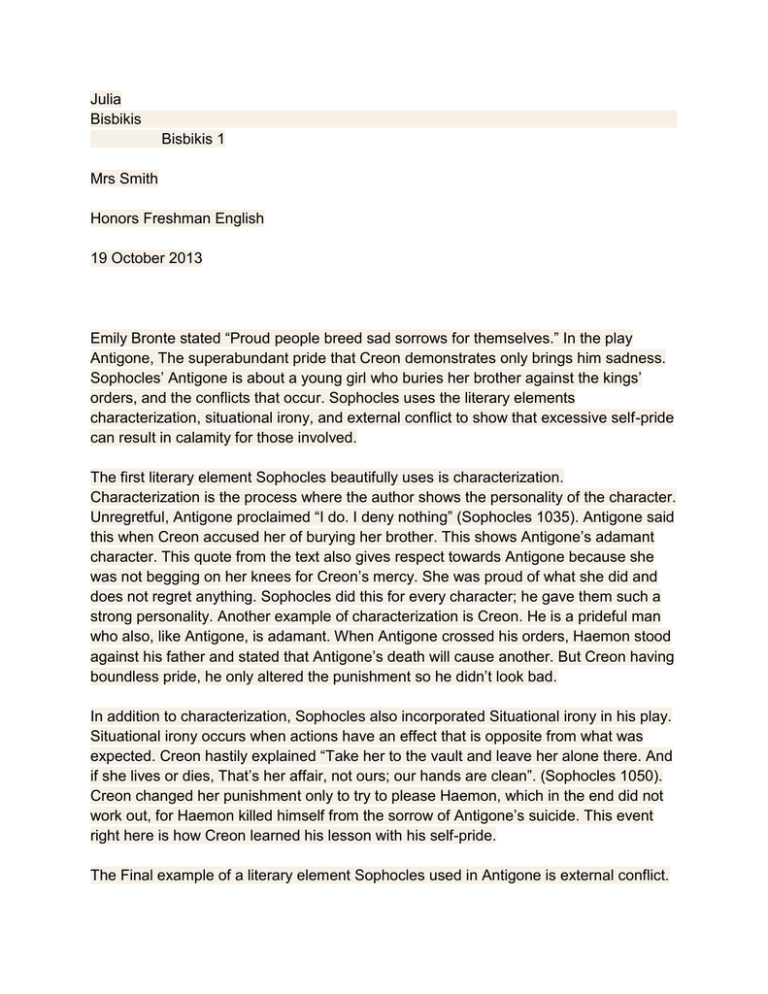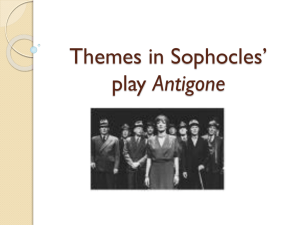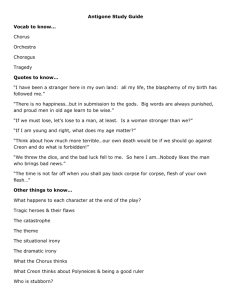File
advertisement

Julia Bisbikis Bisbikis 1 Mrs Smith Honors Freshman English 19 October 2013 Emily Bronte stated “Proud people breed sad sorrows for themselves.” In the play Antigone, The superabundant pride that Creon demonstrates only brings him sadness. Sophocles’ Antigone is about a young girl who buries her brother against the kings’ orders, and the conflicts that occur. Sophocles uses the literary elements characterization, situational irony, and external conflict to show that excessive self-pride can result in calamity for those involved. The first literary element Sophocles beautifully uses is characterization. Characterization is the process where the author shows the personality of the character. Unregretful, Antigone proclaimed “I do. I deny nothing” (Sophocles 1035). Antigone said this when Creon accused her of burying her brother. This shows Antigone’s adamant character. This quote from the text also gives respect towards Antigone because she was not begging on her knees for Creon’s mercy. She was proud of what she did and does not regret anything. Sophocles did this for every character; he gave them such a strong personality. Another example of characterization is Creon. He is a prideful man who also, like Antigone, is adamant. When Antigone crossed his orders, Haemon stood against his father and stated that Antigone’s death will cause another. But Creon having boundless pride, he only altered the punishment so he didn’t look bad. In addition to characterization, Sophocles also incorporated Situational irony in his play. Situational irony occurs when actions have an effect that is opposite from what was expected. Creon hastily explained “Take her to the vault and leave her alone there. And if she lives or dies, That’s her affair, not ours; our hands are clean”. (Sophocles 1050). Creon changed her punishment only to try to please Haemon, which in the end did not work out, for Haemon killed himself from the sorrow of Antigone’s suicide. This event right here is how Creon learned his lesson with his self-pride. The Final example of a literary element Sophocles used in Antigone is external conflict. External conflict is a struggle between a literary character and an outside force, which drives the dramatic plot. Antigone boldly informs Creon “Because I would not transgress the laws of heaven.”.(Sophocles 1050). Antigone created the external conflict by transgressing Creon’s’ orders by burying her brother. This is the overall most important external conflict in the play. There are others of course, for example Creon and Haemon. When Haemon lunged at Creon with his sword only to turn it on himself. These external conflicts establish the excessive self-pride that Creon has. In the play Antigone, Sophocles uses the three literary elements characterization, situational irony, and external conflict to produce the overall message of the play that is excessive self-pride will result in calamity for those involved. Other literary elements that Sophocles used was verbal irony when Teiresias spent a great deal of time persuading Creon to let Antigone go, because it will lead to badness. Creon just ignored him and look what happened. Antigone is important because it shows how you can have it all in a second, but if you mess up by doing something bad, you can have nothing in the next second. Works cited Sophocles. “Antigone.” The language of literature. Applebee, Aurthor N. et al. Boston: Mcdougal Little inc, 2006


